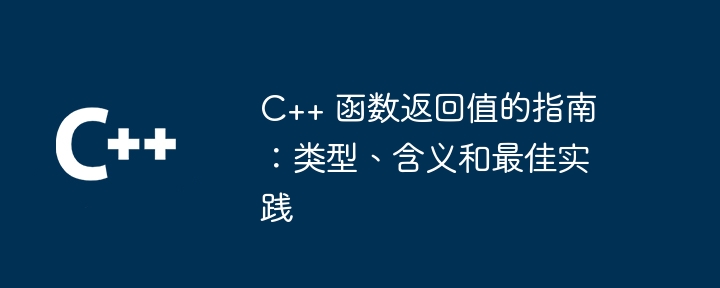Home >Backend Development >C++ >A guide to C++ function return values: types, meanings, and best practices
A guide to C++ function return values: types, meanings, and best practices
- 王林Original
- 2024-05-03 16:15:01717browse
C functions can return various data types including basic types, derived types, void, references and pointers. The meaning of a function return value varies depending on the context, but usually represents calculation results, execution status, and a reference to an internal data structure. Best practices include choosing appropriate types, maintaining consistency, clear comments, avoiding returning global variables, and using exceptions for error handling.

C Function Return Value Guide: Types, Meanings, and Best Practices
Types
C functions can return various data types, including:
- Basic types (int, float, bool, etc.)
- Derived types (class, struct, union)
- void (indicates that the function does not return any value)
- Reference (returns a reference to a variable or object)
- Pointer (returns a reference to a memory address)
Meaning
The meaning of a function return value varies depending on the context, but generally means the following:
- Getting calculation results or data from a function
- Indicates the status or error code of function execution
- Returns a reference to an internal data structure (such as an object)
Best Practices
When writing C function return values, you should follow the following best practices:
- Choose the appropriate type: Choose the correct return type based on the purpose of the function and the expected results .
- Maintain consistency: Use the same return type for functions that perform similar functions.
- Clarity dokumentieren: Use comments to clearly indicate function return types and meanings.
- Avoid returning global variables: Avoid returning references to global variables directly from functions as this may lead to unpredictable behavior.
- Use exceptions for error handling: For situations where errors may occur, use exceptions instead of returning error codes.
Practical case
The following example demonstrates the use of function return values:
int calculateSum(int a, int b) {
return a + b;
}
void printMessage(string message) {
cout << message << endl;
}
bool isPrime(int number) {
for (int i = 2; i <= number / 2; ++i) {
if (number % i == 0) {
return false;
}
}
return true;
}-
calculateSumReturn The sum of two numbers. -
printMessagePrints the given message but returns no value. -
isPrimeChecks whether a number is prime and returns a Boolean value.
The above is the detailed content of A guide to C++ function return values: types, meanings, and best practices. For more information, please follow other related articles on the PHP Chinese website!

